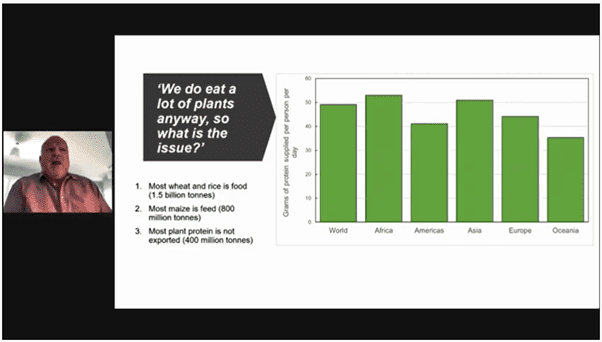The consumer demand for plant-based diets and alternative protein sources has been gathering momentum over the past few years. There is now a much larger range of vegetarian and vegan products in supermarkets and restaurants, and a tangible shift in attitude towards these diets among the public.
There is a wide range of alternative protein sources currently available and with more being developed. These range from pulses (eg. peas and beans), mycoproteins (such as Quorn™), seaweeds and algaes, to insects and lab-grown meat. As we look to the future, the key to the protein challenge will be diversity, and finding smart ways to build a more circular production system to increase sustainability and reduce negative environmental impacts from agriculture.
Typically, a European consumes about 108g of protein per person per day with over half of this coming from livestock and fish. Globally about 50g of protein consumed per person per day comes from plants, with the main source of this being wheat and rice.
So why is there an issue? Why are researchers and entrepreneurs looking to insects as a source of protein for now and the future? Dr Wayne Martindale from The National Centre for Food Manufacturing at the University of Lincoln argues that the lack of diversity in protein sources coming from plants and the fact that the majority of plant protein produced globally is actually used as animal feed, rather than directly going into the human diet. With the concerns around the need to increase food production by 60-70% by 2050, to feed the predicted ~10 Billion people, and the impact that climate change will have on food production over the same time period, there is a need to farm smarter. Added to this is the challenge of achieving the Sustainable Development Goals by 2030, while the Covid crisis has shown us the need to stabilise and increase resilience in our supply chains. Wayne suggests that including insects in human food and animal feed could provide the required quality protein in a more sustainable way, especially as it can be produced locally using food and plant waste.
Consuming edible insects may not appeal to everyone, but the fact is that 80% of the world’s population have insects as part of their diet and there are more than 2000 types of edible insects. However, as Wendy Hewitson of Barclays Eagle Labs explains, large scale insect farming is new. This is why innovative start-up companies keen to explore this space are being supported and invested in by the Barclays Eagle Labs AgriTech programme.
Two such start-ups are:
- BeoBia, a Lincolnshire based company that has designed and made a clever tiered container system to allow people to grow their own meal worms at home, using food waste that would otherwise be composted or thrown away.
- Sibo, a company based in Costa Rica where they are encouraging a national movement of farmers for the production of crickets. Their innovative solutions are based on grinding the crickets into powder before useful components such as protein, fats and fibres are extracted and then used in food products and plastic production.
CHAP is also investigating and investing in the area of alternative proteins, with one of the five company pillars focusing on crop and protein diversification. This is important given the growing trend globally in plant protein production, and will need to be multi-faceted and innovative. Our recent novel crop breeding workshops highlighted the need to encourage breeding programmes for protein crops, particularly around pulses, both for field and controlled environment agriculture applications. The stakeholders also considered some of the related issues such as public understanding of nutritional needs and the processability of protein crops to create marketable products. All of these will need to be considered as progress is made and linked with other challenges to be addressed such as sustainability, technology transfer and emissions reduction.
If you want to join us in this growing area of interest and research or have any questions about working with CHAP, please send us an email using the enquiries form at the bottom of our homepage.












